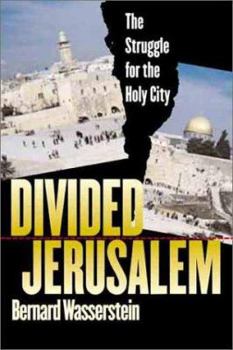Divided Jerusalem: The Struggle for the Holy City
Select Format
Select Condition 
Book Overview
In this timely book, Bernard Wasserstein offers the first authoritative history of the fraught diplomatic relations surrounding the Holy City of Jerusalem. Jews, Muslims, and Christians have all... This description may be from another edition of this product.
Format:Hardcover
Language:English
ISBN:0300091648
ISBN13:9780300091649
Release Date:September 2001
Publisher:Yale University Press
Length:432 Pages
Weight:1.85 lbs.
Dimensions:1.3" x 6.2" x 9.8"
Customer Reviews
1 rating
Scholarly survey of 'the question of Jerusalem'
Published by Thriftbooks.com User , 21 years ago
This book is a study of the `question of Jerusalem' in international diplomacy, a matter that is bound up with the question of Israel-Palestine relations. It presents a very detailed history of the city's troubled past and present.Unhappy Palestine, so near to Europe, so dear to God! For millennia, three intolerant monotheisms have fought over the Holy Land, and the more religion has flourished, the less the chance of resolution. More recently, outside colonial forces, the Vatican particularly, have fomented trouble. As Lord Palmerston warned, "Religious protections pave the way for political dismemberments." Nowadays, religious fanatics are a large part of the problem, whether ultra-Orthodox New York Jews creating illegal settlements in the West Bank and Gaza, or Hamas leaders promoting terror tactics against Israeli workers.In June 1967, Israel seized and annexed east Jerusalem. In July, the UN General Assembly resolved that the Israeli government's measures there were invalid and called on it to rescind them. In May 1968 the Security Council made a similar Resolution; the US government abstained both times. The USA has consistently used its veto to support the Israeli government's building of illegal settlements. On 31 October 1995, an agreement was reached between Israel's Deputy Foreign Minister, Yossi Beilin, and a close colleague of Chairman Arafat, Abu Mazen. They agreed that there should be a Palestinian state within agreed boundaries, in which Israeli settlements would be dismantled, and to which Palestinian refugees would be allowed to return. Israel would recognise eastern Jerusalem as the capital of Palestine, and Palestine would recognise western Jerusalem as the capital of Israel. This is a far better basis for agreement than the 2000 Camp David offer, whereby Jerusalem was to be the `eternal and unified capital of Israel'.The solution has to be in terms of two states, not the Bush-Sharon refusal ever to countenance an independent Palestine, nor (the mirror image) Hamas' refusal ever to recognise Israel.





